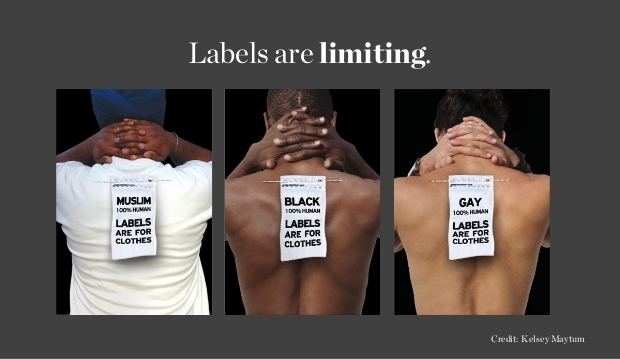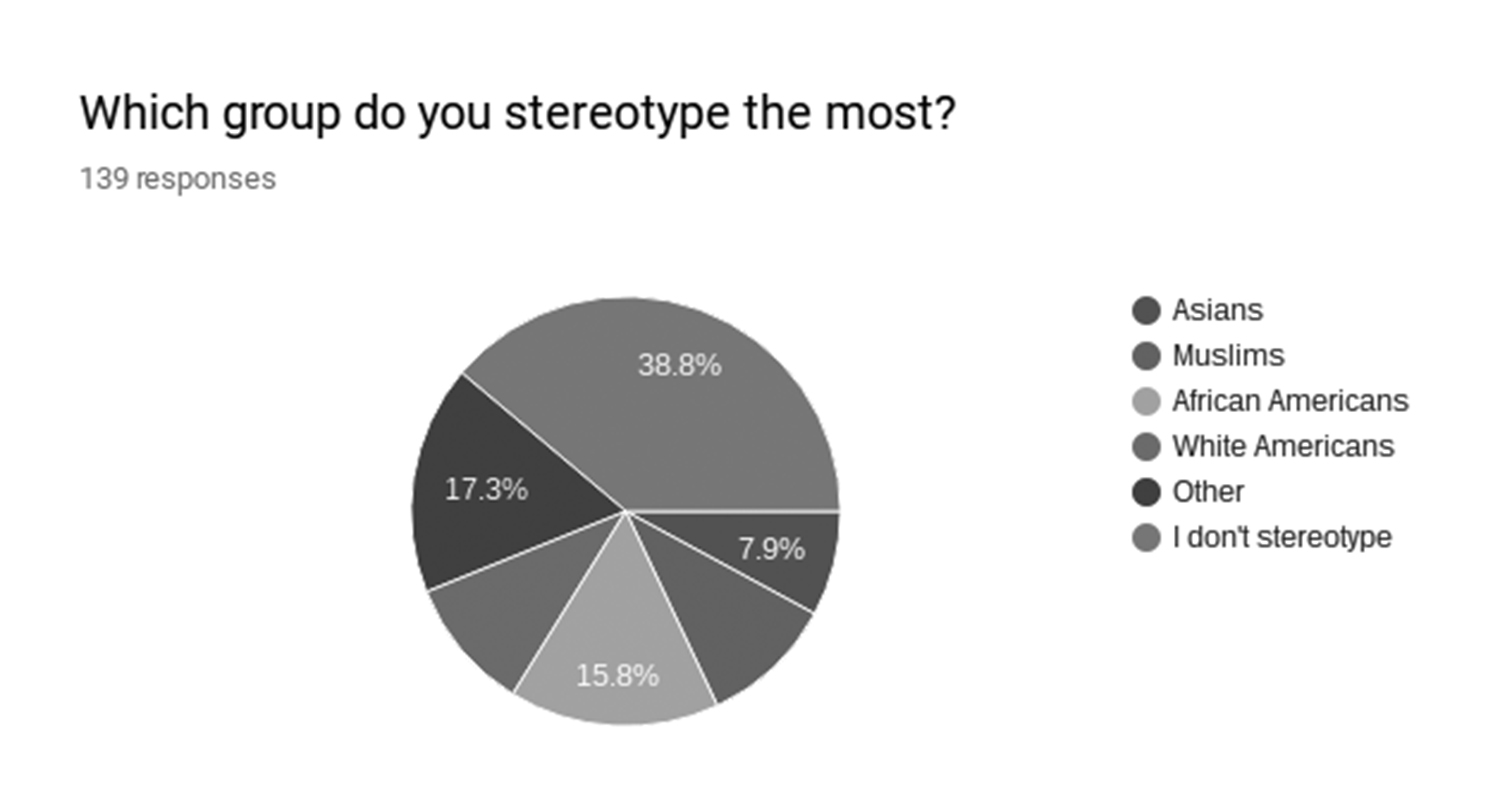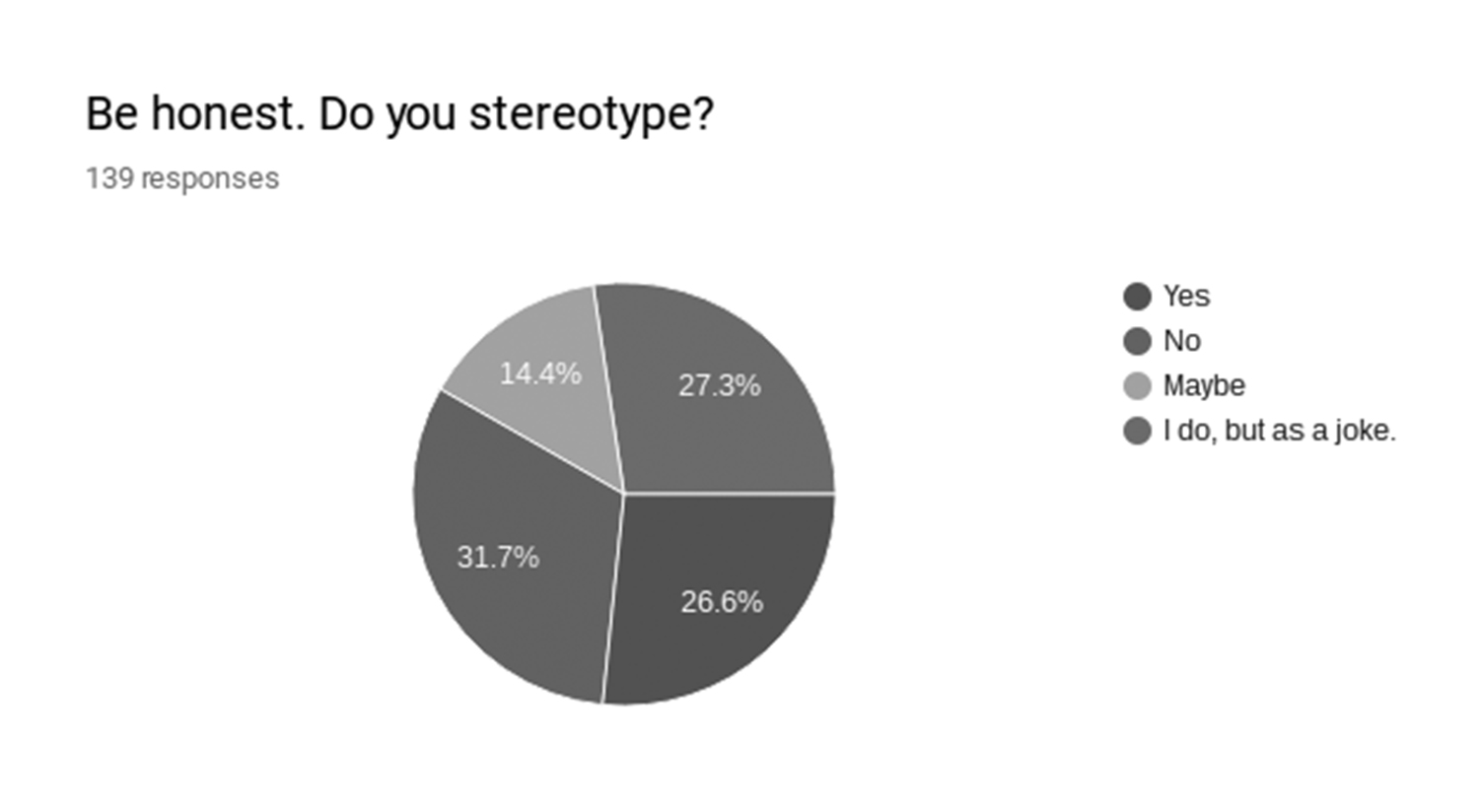Teens fighting limits of labels

No matter what, people always seem to have preconceptions about people that they don’t really know. You can hear things in the hallway or from your friends about others, that can easily turn into one big game of Telephone. A person can be judged by their looks and their actions, and what does that really say about them? And what does that say about the person judging them?
Something that people tend to do is judge others that they don’t know based on stereotypes that may or may not be correct with that person. It’s no question that stereotypes didn’t just come out of nowhere. They most likely were created based on a pattern found in a certain group of people that has caught on to be the main identification of them. Yes, these preconceptions of people can be good or bad, and they can be funny, but to whom? The people stereotyping or the person being stereotyped?
In a survey taken by students from Cedar Falls, over half of the students that had taken the survey answered that a person’s personality affected what they thought about a person in a negative way. Twenty four percent of the students who had taken it said that race and religion affected their views of a person negatively, and another nine percent chose “other.” When asked what they meant by “other,” many students said that the way someone acts toward others affected what they thought of a person.
The answers seemed fair. No one would want to be friends with someone who treats others badly, and, of course, you would want to befriend someone who is nice and caring. But how does someone’s race and religion make you think negatively of them? If someone’s views and beliefs don’t match yours, does that make them good or bad?
Everyone should be entitled to their own opinions, but where is the line drawn? Once you offend someone with your opinions or “jokes,” does that make them hurt or just sensitive? Of the people who had taken the survey, 59 percent said they had been stereotyped before. Another question in the survey asked students to answer honestly if they stereotyped. Twenty nine percent of answers said they did, and half of those people that said, yes, they did it as jokes, but are they only jokes for certain stereotypes?
If you tell an Asian person they’re smart because they’re Asian, is that considered an insult or a compliment? “Well they did say you were smart,” someone might argue, but why is it that they are smart because they are Asian? Along with that, how does a girl having blonde hair make them a “dumb blond”? And why does it only apply to girls? A person’s intelligence isn’t based on their race or the color of their hair. It’s classified by their intelligence — nothing more, nothing less.
There are so many preconceptions of people in certain groups, and they can be completely off of what that person is actually like. Having these ideas of people without actually knowing them can be very dangerous because you can hurt the person’s feelings while thinking it’s just a joke. Stereotypes can also take tolls on people’s mental health.
Not only can stereotypes be extremely hurtful, but thoughts that people can have on their stereotypes can put them in a box. Being stereotyped creates the idea in a person’s mind, that this is the only thing they can be. These are the standards that they have to live up to, and if they don’t, they become an outsider to their stereotype.
It’s hard to realize that you are more than what people think of you firsthand. When so many people put a label on you, it’s a struggle to shake it off, and if you stereotype, you have to realize that not everyone can take their stereotype as a joke, and it can really get into people’s heads that this is the kind of person they have to be.
School is the perfect place for stereotyping to take place, especially when it’s your first year starting. Everyone either knows each other, or not at all, and when you don’t know a person, you’re gonna have some first impressions of them.
From students whose identities have given them misconceptions on who they are as people, see their opinions on stereotypes.
JILLIAN GAINES:
“basic white girl”
Q: What is your opinion on stereotypes?
A: I don’t really like stereotypes because to me, it seems like something that people have to either strive to be or it’s something people are conformed to.
Q: How do you think stereotypes can affect people?
A: I think it can make people feel bad about their gender, race or where they come from and make them feel as if being different is something to look down upon.
Q: How do you get stereotyped?
A: Some people think I talk a certain way or dress really “basic,” and some people think I’m dumb just because I’m blonde.
Q: What do you think of others who stereotype?
A: I don’t think it’s very fair of them to hold others to a certain standard when everyone is trying to make a name for themselves.
Q: Why do you think people stereotype?
A: I think people find it easier to place people in a group, so then it’s easier for them to understand each other, rather than get to know another person.
Q: How do you respond to being stereotyped?
A: I usually ignore them, but if someone is being offended, then I usually say something and get the record straight.
Q: How do you think others should respond to stereotypes?
A: I think others should try not to make stereotypes a thing and try to make individuality more popular.
FATEMEH MOOSAVI:
“Terrorist”
Q: What are your opinions on stereotypes?
A: I don’t think there’s any way stereotypes can be good and harmless. Categorizing and reducing people to a single idea is pretty dehumanizing for anyone. It paints a lot of assumptions that are usually harmful and inaccurate as truth, and that causes a lot of damage to the societal image of entire groups of people based on one thing.
Q: How do you think stereotypes can affect people?
A: It puts them in this little box that limits how they see themselves or others see them. Having to limit yourself to the small space others put you in can really destroy the confidence you have to reach your fullest potential. It stops you from trying new things that are really important to you so that others can feel comfortable seeing you as just one thing, rather than a normal, complex human being.
Q: How do you get stereotyped?
A: It always has something to do with being a minority. In Iran, people think of me as backward or a traitor because I’m Arab. Here, people call us terrorists and think we all need to be saved by them. The one that’s most annoying and difficult to live with is the assumption that Muslim or brown girls can’t be attracted to other girls. Most people don’t even seem to consider that some Muslim girls are also LBT.
Q: What do you think of people who stereotype?
A: They probably haven’t had the resources needed to educate themselves on how they can treat others more fairly, and I think there’s always room to learn and improve yourself in that aspect. It’s constant growth throughout your life, so I understand it to some extent. Others that are just unwilling to let go of their ignorance and bigotry are a lot harder to deal with, and most of the time, it’s just very embarrassing and sad for them to think it’s OK to continue such behavior.
Q:How do you respond to stereotypes?
A: I’ve just learned that I can’t expect others to change, so I have to remember that I am who I am, and others can’t dictate or change what I can be. I just try to enjoy surprising people rather than get upset by it.
JONATHAN MORAN:
“Disrespectful teenager”
Q:Do you think stereotypes are good or bad?
A: I think they’re bad because you judge people before you even get to know them, which can be very hurtful. They make people feel bad about being who they are.
Q: How do you think stereotypes can affect people?
A:I believe stereotypes can hurt people a lot. It can be racist, sexist and just plain mean.
Q: How do you get stereotyped?
A: People assume that as a teenage, you are disrespectful and rude. Like if you walk into a restaurant, servers are probably thinking, “Oh no, here comes these disrespectful teenagers. They’re gonna trash the place. They won’t even leave a tip.”
Q: Do you think you fit into this stereotype?
A: No, because I tend to respect people older than me, and when I go to places, I try to be polite and be positive. The people that are rude make that stereotype for other people who are actually nice.
Q: What do you think about people who stereotype others?
A: I feel as though they are judgemental and should learn to get to know someone before they judge them. I believe they do it because they are maybe unhappy with their own lives, so they judge other people who are different from them.
Q: How do you respond to people that stereotype you?
A: I try to ignore it and realize that what they think doesn’t matter to everyone else
Q: How do you think others should respond to being stereotyped?
A: I believe that people getting stereotyped should either confront the person that’s doing it and showing them it’s not true, or you can ignore it and realize that what a few people think now, won’t matter at all in 15 years.
SARIMAH OGBONDAH:
“Oreo”
Q: Do you think stereotypes are good or bad?
A: I think stereotypes are bad. I think so because every person is filled with such contrasting characteristics that even the most prominent one won’t suffice as an accurate way to describe them. Stereotypes are just a way to label people without properly knowing them.
Q: How do you think stereotypes can affect people?
A: I think that stereotypes make people feel lesser than who they are. Stereotypes are very confining and judgmental, and that can make people feel like that stereotype is all they are.
Q: How do you get stereotyped?
A: Sometimes, I hear stuff like, “You’re the whitest black person I know,” or something of that nature. It’s annoying because I’m just trying to be true to myself and live my life, and there are people who constantly feel as though they have such a good view of who I am and need to tell me what they see.
Q: What do you think of people who stereotype?
A: I think they’re stupid. If you stereotype, you’re judgmental and inconsiderate.
So what you see on the outside is far from what’s on the inside. If someone treats you with respect along with others, why is it that their race is a problem? Race does not determine intelligence or status, and it does not affect how a person treats others. If someone likes something that is widely popular, that doesn’t make them “basic,” and a person’s age doesn’t exactly define their maturity.
We think we can judge people based on their appearances, and we think that we know them based on what we see from other people of similar race, religion or status as them. But as cliche as it sounds, what matters most about a person isn’t based on the color of their skin, their gender or their age; what matters most is the only thing that people should pay attention to, which is a person’s personality.











You must be logged in to post a comment Login